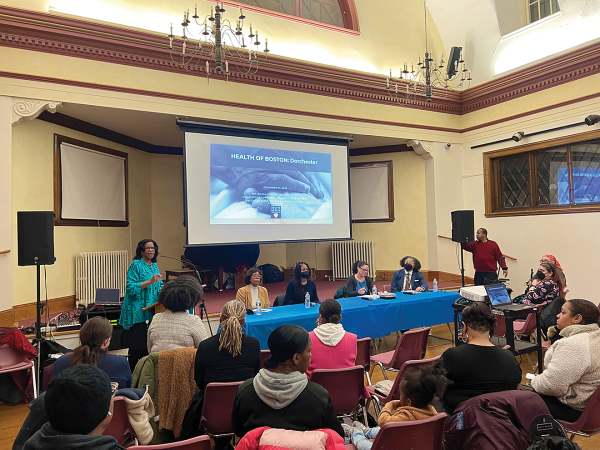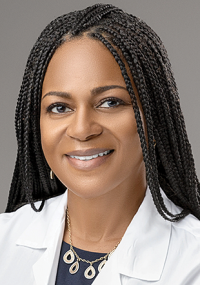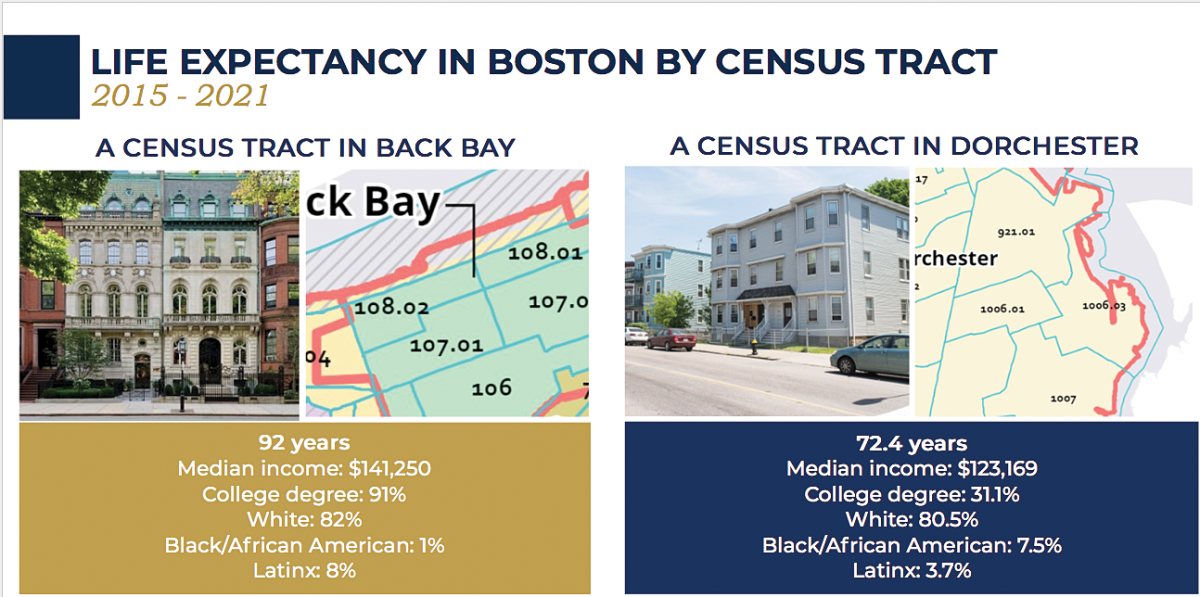December 27, 2023

Questions and answers flow at the health forum in Codman Square on Thurs., Dec. 14.
Seth Daniel photo

On Thurs., Dec. 14, about 100 people filled the seats of The Great Hall at Codman Square to talk about the health status of both the city at large and the Dorchester population specifically and hear from four experts, including Dr. Bisola Ojikutu, the executive director of the Boston Public Health Commission (BPHC).
Ojikutu shared citywide data from 2017-2021 about life expectancy and mortality, asthma rates, diabetes, cancer, and other key indicators that the city agency tracks citywide and by neighborhood. As in years past, the data showed disproportionate impacts to Black and Latino residents and in certain zip codes, including those in Dorchester.
Ojikutu called attention to the gap in average life expectancy, which is 80.2 years citywide, but lower in Dorchester zip codes 02121 and 02125 (77.8 years) and in 02122 and 02124 (78.2 years).
“If you stopped here, you would say that’s not so bad. Between Dorchester and the average in Boston is just a few years,” said Ojikutu. “What you need to do is zoom in closer and see what is happening in each individual community.”
To highlight the disparity, Ojikutu showed a slide that compared the life expectancy for a census track in Back Bay (92 years) to one in Dorchester’s 02125 zip code, which was 72.4 years.
“You should ask yourself why is that? What is going on?” she said.

The leading causes of death in Dorchester are, in order, accidents, cancer, heart disease, homicide, and diabetes.
The panel emphasized that race and ethnicity play a role in the life expectancy and mortality rates in Boston. “Black individuals have the highest rate of premature mortality,” said Ojikutu. “Black people are dying at a younger age than other people.”
Dorchester has far higher rates of emergency room visits for asthma emergencies than the rest of Boston. A chart showing the citywide average per 10,000 residents indicated that Dorchester asthma sufferers are far more likely to go to an emergency department than other neighborhoods. Only Mattapan and Roxbury posted higher rates.
The cancer mortality rate is highest in South Boston, where 164.5 deaths per 100,000 residents were reported annually between 2019-2021. Mattapan, Hyde Park, Jamaica Plain, and Roxbury followed, with Dorchester’s 02122 and 02124 in the next position, well above the citywide average of 121.9 deaths per 100,000. The neighborhood’s 02121 and 02125 zips were in the 10th position in the cancer rankings by neighborhood with 124.3.
Another troubling indicator of race-based disparity in Boston is the heart disease mortality rate, which is 37 percent higher for Black Bostonians than for white residents. Black residents are also disproportionally impacted by diabetes deaths, with Black men accounting for 58.2 average deaths per year per 100,000 residents in 2020-2021. The average annual diabetes-related death rate for white men in that same period was 39.9. Black women accounted for diabetes deaths at a rate 3.3 times higher than white women, according to the BPHC’s Diabetes Report. Dorchester residents have a higher rate of diagnosed diabetes cases too, but less than Roxbury, Mattapan, and Hyde Park. The overall percentage of Boston residents with diabetes is 9.1 percent. In Dorchester, it’s 12.8 percent in 02121,02125 zips, and 11.1 percent in 02122 and 02124.
A panel discussion with Gail LatimoreCodman Square Neighborhood Development Corporation executive director Gail Latimore, board chair of the Boston Community Health Collaborative, Mary Ellen McIntyre, and Dr. Renee Crichlow, CSHC chief medical officer, followed Dr. Ojikutu’s remarks. It was moderated by Melissa Hector, the director of equitable and strategic initiatives at the Boston Public Health Commission.
“Just knowing what the situation is, the root cause of why we are in this situation, is important so we can change it,” said Latimore. Added McIntyre: “The key to this is hearing from you about the things that will actually make a difference here in Dorchester.”
Crichlow said one way to increase life expectancy in the neighborhood is by addressing allostatic load, which refers to the collective burden that life events have on an individual. Specifically, she argues four things can lessen allostatic load and improve the quality of life in Dorchester.
“Affordable housing, affordable housing, affordable housing, affordable housing,” she said, a response was met with a round of applause.
Latimore agreed: “It’s all about stable, affordable, safe housing. It’s fundamental to life expectancy. We know that housing is a social determinant of health.”
In addition to the need for housing, residents expressed their desire for better mental health services in the neighborhood. One mother explained that her daughter battles depression and has attempted suicide. When she finally sought out help, the program she found was not covered by her insurance.
Ojikutu replied with exasperation. “The system is broken, there are so many gaps, we need to work on it as a community.” At that point, Leah Arteaga from the Massachusetts Behavioral Health Help Line was invited up to the podium and explained that those in need of help can utilize the Mass Help Line 24/7, 365 days a year.
Those in attendance were greeted by a welcome table where each family could collect a $50 gift card to Target. Dinner– chicken, fish, or vegetarian dinner paired with a bottle of water –was also served as representatives from the BPHC, Massachusetts Behavioral Health Help Line, Bowdoin Street Health Center, All of Us Research Program, Neighborhood Trauma Team, and Codman Square Health Center interacted with attendees.
Crichlow said she hoped the event was the start of a positive change. “The voices we have here today are great but they’re really not good if they don’t speak up,” she said. “Forty-five years from now I want to look back on this meeting and say that’s when it changed in Codman Square.”
“I’m five minutes from here,” said Ojikutu. “This is my community and I want my community to be healthy, so we have to figure out the interventions that work to change the circumstances that we are in.”


